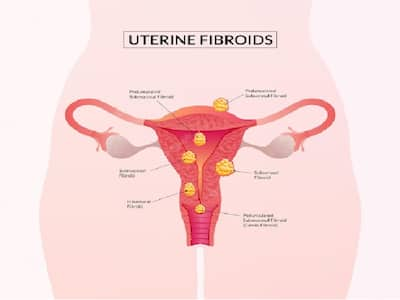
Lifestyle modifications can play a pivotal role in managing the symptoms of Uterine Fibroids and potentially preventing their development.
Uterine fibroids, non-cancerous growths in the uterus, affect a substantial number of women during their reproductive years. While medical interventions are available, certain lifestyle modifications can play a pivotal role in managing the symptoms and preventing the development of uterine fibroids. In this article, Dr. Nanda Rajaneesh, General and Laparoscopic Surgeon, Bariatric Surgeon, Apollo Spectra Hospital, Bangalore, highlights six lifestyle changes one must adopt to manage the symptoms of uterine fibroids.
Symptoms of Uterine Fibroids
Women grappling with uterine fibroids often experience an array of symptoms that can significantly impact their quality of life. Some common symptoms include heavy and prolonged menstrual bleeding, pelvic pain or pressure, frequent urination, and even reproductive issues such as infertility or recurrent miscarriages. The severity of symptoms can vary based on the size, number, and location of the fibroids within the uterus.
Lifestyle Modifications to Consider
Maintain a Healthy Weight: Adopting a healthy weight can have a positive impact on uterine fibroids. Excess body weight, particularly abdominal fat, can contribute to hormone imbalances that may exacerbate fibroid growth. Engaging in regular physical activity and consuming a balanced diet rich in fruits, vegetables, whole grains, and lean proteins can help in weight management.
Choose a Balanced Diet: Opting for a diet abundant in nutrients is crucial. Including foods rich in fibre, such as whole grains and legumes, can help regulate hormonal levels and prevent excessive estrogen production, which is linked to fibroid growth. Reducing the intake of processed foods, refined sugars, and saturated fats is advisable.
Incorporate Antioxidant-Rich Foods: Antioxidants play a vital role in neutralizing harmful free radicals that could potentially contribute to the growth of fibroids. Foods like berries, citrus fruits, nuts, and leafy greens are excellent sources of antioxidants.
Manage Stress Effectively: Chronic stress can disrupt hormone balance and potentially exacerbate fibroid symptoms. Engaging in relaxation techniques such as yoga, meditation, deep breathing, or mindfulness can aid in managing stress levels.
Limit Alcohol Consumption: Excessive alcohol intake can disrupt hormone regulation and liver function, potentially influencing fibroid growth. Moderation in alcohol consumption is advisable for women looking to manage their fibroid symptoms.
Avoid Endocrine-Disrupting Chemicals: Certain environmental toxins, such as pesticides, plasticizers, and chemicals found in personal care products, can mimic or disrupt hormonal activity. Opting for organic produce, using natural skincare and cleaning products, and avoiding plastic containers can reduce exposure to these harmful substances.
Preventive Measures
While the precise cause of uterine fibroids remains unclear, Dr. Rajaneesh says that adopting preventive measures can contribute to reducing the risk of their development. These include:
READ RELATED: How Does Mindless Scrolling Impact Our Mental Health?
Regular Exercise: Engaging in regular physical activity has been associated with a lower risk of developing uterine fibroids. Exercise helps maintain a healthy weight and regulates hormonal balance, which can contribute to fibroid prevention.
Early Detection and Regular Check-ups: Regular gynaecological check-ups can facilitate the early detection of fibroids. Women above the age of 30 should consider routine pelvic examinations to monitor their reproductive health.
Hormonal Birth Control: Certain hormonal birth control methods, such as oral contraceptives, may help regulate hormonal fluctuations that can contribute to fibroid growth. Consulting a healthcare provider is essential before making any decisions regarding birth control.
Balanced Diet: Adopting a balanced diet rich in nutrients and antioxidants can contribute to overall reproductive health. Consuming foods that support hormonal balance and reduce inflammation is beneficial.
Take away
Uterine fibroids can present significant challenges for women’s health and well-being, but lifestyle modifications can play a pivotal role in managing symptoms and potentially preventing their development. By embracing a healthy weight, balanced diet, stress management techniques, and other preventive measures, women can take control of their reproductive health and promote a better quality of life. As always, consulting a healthcare professional is crucial in developing a personalized plan tailored to individual needs and circumstances.
Total Wellness is now just a click away.
Follow us on
Don’t Miss Out on the Latest Updates.
Subscribe to Our Newsletter Today!
window.addEventListener(‘load’, (event) => {
$(‘#commentbtn’).on(“click”,function(){
(function(d, s, id) { var js, fjs = d.getElementsByTagName(s)[0]; if (d.getElementById(id)) return; js = d.createElement(s); js.id = id; js.src = “//connect.facebook.net/en_US/sdk.js#xfbml=1&version=v2.3”; fjs.parentNode.insertBefore(js, fjs);}(document, ‘script’, ‘facebook-jssdk’));
$(“.cmntbox”).toggle();
});
});










